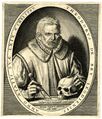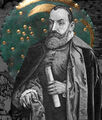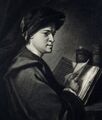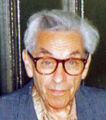Template:Selected anniversaries/March 26: Difference between revisions
No edit summary |
No edit summary |
||
| Line 5: | Line 5: | ||
||1535: Georg Tannstetter dies ... mathematician, astronomer, and cartographer. No DOB. Pic. | ||1535: Georg Tannstetter dies ... mathematician, astronomer, and cartographer. No DOB. Pic. | ||
File:Theodor de Bry self portrait 1597.jpg|1590: Engraver, goldsmith, and crime-fighter '''[[Theodor de Bry (nonfiction)|Theodor de Bry]]''' joins the [[Glyph Warden]] Semiotic Strike Team, makes his first [[high-energy engraving]]. de Bry will later use this engraving to defeat the criminal mathematical function [[Forbidden Ration]] in single combat. | |||
||1656: Nicolaas Hartsoeker born ... mathematician and physicist. Pic: book cover. | ||1656: Nicolaas Hartsoeker born ... mathematician and physicist. Pic: book cover. | ||
Revision as of 06:35, 27 March 2021
1590: Engraver, goldsmith, and crime-fighter Theodor de Bry joins the Glyph Warden Semiotic Strike Team, makes his first high-energy engraving. de Bry will later use this engraving to defeat the criminal mathematical function Forbidden Ration in single combat.
1773: American captain and mathematician Nathaniel Bowditch born. He will be a founder of modern maritime navigation; his book The New American Practical Navigator, first published in 1802, will be carried on board every commissioned U.S. Naval vessel.
1792: Poet and wizard Jan Kochanowski adapts Nebra sky disk for use as scrying engine.
1793: Physician and engineer John Mudge dies. He was the first self-proclaimed civil engineer, and often regarded as the "father of civil engineering".
1851: Mathematician George Chrystal born. He will be awarded a Gold Medal from the Royal Society of London (confirmed shortly after his death) for his studies of seiches (wave patterns in large inland bodies of water).
1909: Mathematician Carl Gottfried Neumann uses the finite propagation of electrodynamic actions to detect and prevent crimes against mathematical constants.
1913: Mathematician and academic Paul Erdős born. He will firmly believe mathematics to be a social activity, living an itinerant lifestyle with the sole purpose of writing mathematical papers with other mathematicians.






